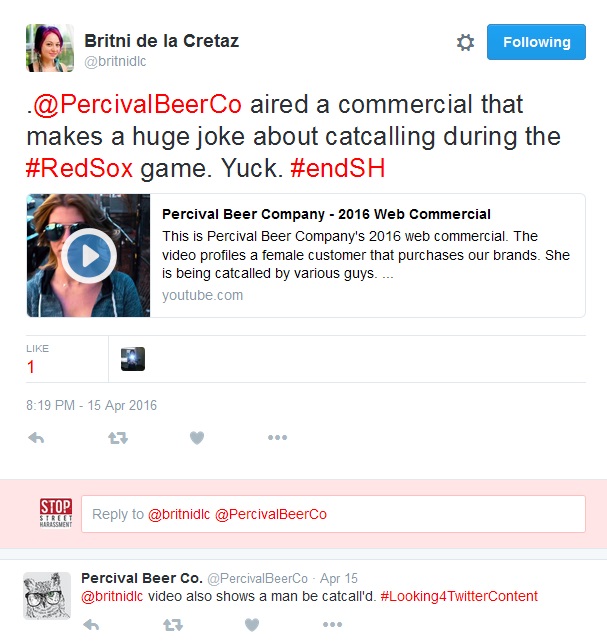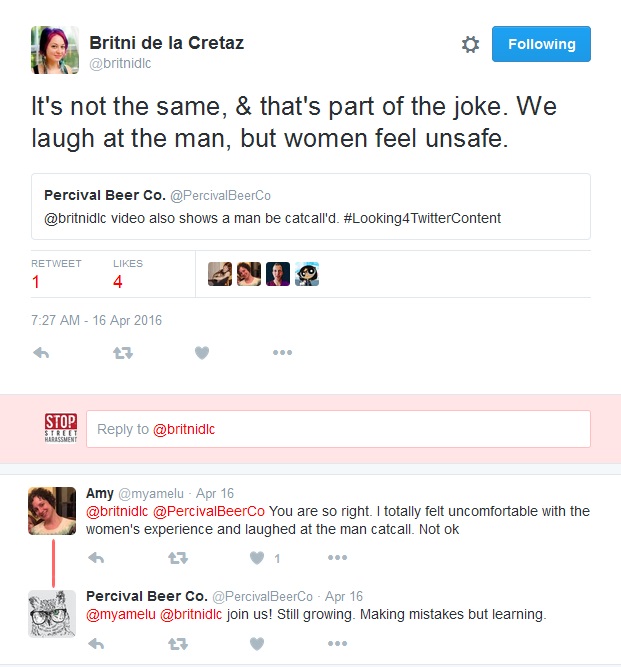By Britni de la Cretaz
No matter how many times women and other marginalized folks make the point that street harassment isn’t a joke, it seems that advertisers aren’t getting the message. Last week, a new local brewing company out of Boston, Massachusetts, aired their very first TV spot. It ran during the Red Sox game and, unfortunately, it was problematic.
The commercial begins with a woman walking into a liquor store, the camera (and the store clerk’s eyes) lingering on her butt. She buys two six packs of Percival Beer Company’s beer and walks home, being subjected to catcalls like, “Hey, let me get some of that!” on her way. When she gets home, she tells her male partner that she’s never doing that again due to the harassment she received. The ad then cuts to her partner buying the same beer and facing the same catcalls on his walk home, presumably for a laugh.
When I tweeted at the company about the ad, they at first tried to explain away why the ad was OK, telling me that the “video also shows a man being catcalled.”


But as I (and another Twitter user) pointed out to them, men and women being catcalled are not comparable.
The thing is, when a woman is catcalled by a man, there is a power differential that doesn’t exist when a man is harassed by that same man. When women are harassed by men on the street, we legitimately fear for our safety. Often times, that harassment escalates into physical violence. Even if the woman is being catcalled about the beer and not her body, the intentions don’t change the impact of those comments. For a woman walking through public space, we don’t recognize the difference. What we hear is unsolicited commentary directed our way from men we don’t know. And this isn’t a funny hypothetical for us; it’s a reality that women and other marginalized people face on a daily basis when they walk down the street.
So while we can laugh at the man being catcalled, that’s an indication of the male privilege (and homophobia) inherent in that interaction. He has the privilege to be taken aback and walk on from the harassment because it’s not seen as threatening to him, whereas, even in the commercial, his female partner makes it clear that the same interactions made her feel unsafe.
To their credit, when faced with two women who were unhappy with their commercial, Pervical Beer Company responded that they are “still growing. Making mistakes but learning.” But these kinds of mistakes don’t need to happen. These kinds of mistakes happen when there are no women at the table to say, “Hey, this isn’t actually a good idea.” Mistakes like this are an indication that companies need to diversify their staff behind the scenes so that things like this don’t happen in the first place.
It’s even more disheartening that this ad is airing during Red Sox games, as the last people that need to have the idea that street harassment is a joke reinforced is the largely male audience that watches sporting events. Intentional or not, this commercial is harmful.
We need our advertisers to do better than this if we ever hope to end violence against marginalized folks in public space. So advertisers, the next time you think you want to make a joke about street harassment, I have some advice for you: don’t.
Britni de la Cretaz is a freelance writer, feminist parent, and Red Sox enthusiast living in Boston. She has been organizing against street harassment locally since 2011. Follow her on Twitter at @britnidlc.
